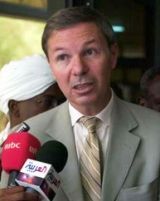UN downplays Sudanese president rejection
June 22, 2006 (‘KHARTOUM) — The head of U.N. peacekeeping downplayed the Sudanese president’s rejection of a U.N. mission for Darfur, saying it was not the end of the story.
 President Omar al-Bashir on Tuesday accused Jewish groups of pressing for the U.N. mission, and vowed never to let U.N. peacekeepers into Sudan’s western region of Darfur.
President Omar al-Bashir on Tuesday accused Jewish groups of pressing for the U.N. mission, and vowed never to let U.N. peacekeepers into Sudan’s western region of Darfur.
“Obviously, we would like to hear a different opinion,” U.N. peacekeeping chief Jean-Marie Gehenno told The Associated Press Wednesday, shortly after meeting al-Bashir. “We want to believe that this is not the end of the road.”
Gehenno was ending a two-week visit to Darfur and Khartoum with some 40 U.N. and African Union experts to plan for a large U.N. force to take over peacekeeping in Darfur from the AU’s poorly equipped 7,000 troops who have been unable to halt more than three years of violence.
Nearly 200,000 people have been killed in Darfur and more than 2 million displaced since members of ethnic African tribes rose in revolt against the Arab-led Khartoum government in early 2003.
Sudan’s government is accused of responding by unleashing Arab militias known as the janjaweed who have been blamed for the worst atrocities. Khartoum denies any involvement, but has committed to disarm the janjaweed under the peace deal.
Gehenno said he had assured the Sudanese president that the U.N. had no “hidden agenda.”
“There are many misunderstandings about the U.N.’s goals in Darfur that we are trying to solve with the Sudanese government,” Gehenno said.
The U.S. and Europeans have been pushing for a large U.N. force to replace the African Union’s poorly equipped 7,000 troops, who have been unable to halt the near daily killing, raping and looting of refugees in the remote region of western Sudan where more than 200,000 have died in the last three years.
Gehenno said the priority would be to strengthen the 7,000-strong AU force. He confirmed that the U.N. still hoped to send its own peacekeeping mission by early 2007.
The chief peacekeeper also insisted that U.N. peacekeepers would “only go to Darfur in full cooperation from the Sudanese government.”
There has been “a slight improvement” in the situation since the signing of the Darfur Peace Agreement last month between the region’s main rebel group and the government, Gehenno said.
But he said the situation was precarious and infighting among rebel factions had cut off over 100,000 people from humanitarian assistance.
Presidential adviser Majzoub Khalifa said the government believes letting in the U.N. could destablize Sudan.
“We do not want Darfur to become a new Iraq,” he said, claiming tribal leaders in Darfur had warned authorities they would form insurgency groups against U.N. peacekeepers.
U.S. President George W. Bush, who has called for the United Nations to take over peacekeeping in Darfur, reiterated Wednesday that he viewed the government-backed attacks on civilians there as genocide.
“I care deeply about those who have been afflicted by these renegade bands of people who are raping and murdering,” he said at a summit with European leaders in Vienna.
In Washington, State Department spokesman Adam Ereli pressed for Sudan to accept the U.N. force. “As long as violence continues in Darfur, the Sudanese Government is going to be held responsible, regardless of the circumstances,” the spokesman said.
Deploying U.N. troops is crucial to salvaging the brittle peace deal signed by the Sudanese government and the main Darfur rebel movement, which has warned the agreement will collapse without the peacekeeping force.
Sudan’s president said Monday he would personally lead “the resistance” if foreign troops come to Darfur.
“If we return to the last demonstrations in the United States, and the groups that organized the demonstrations, we find that they are all Jewish organizations,” al-Bashir said Tuesday, referring to rallies held in New York and Philadelphia earlier this year.
The U.N. peacekeeping chief said a new cycle of violence threatened Darfur and that solving the crisis was “an emergency.”
The suffering “can leave no one indifferent,” Gehenno said. “History will judge us harshly if we do not prevent it,” he said.
(ST/AP)
